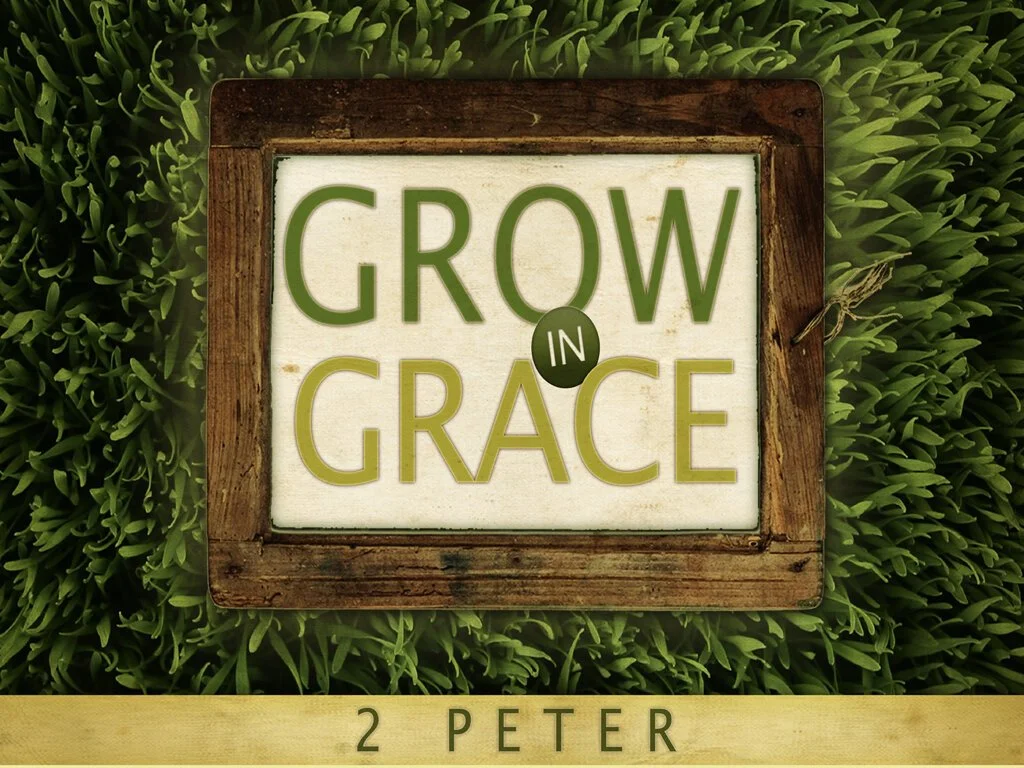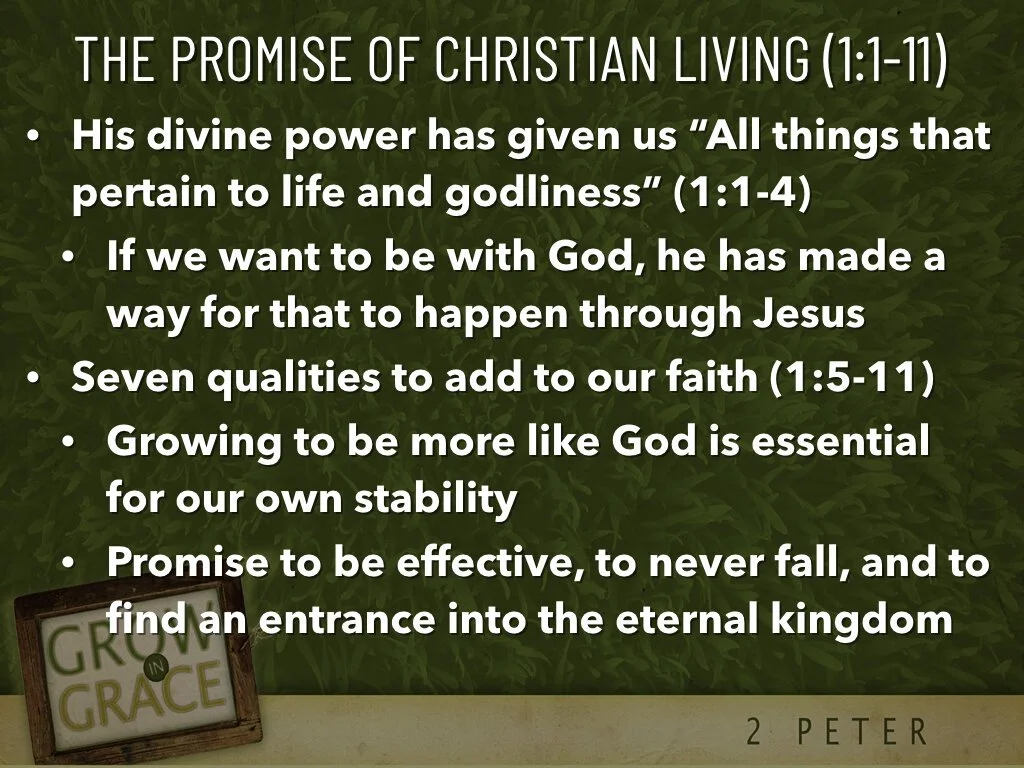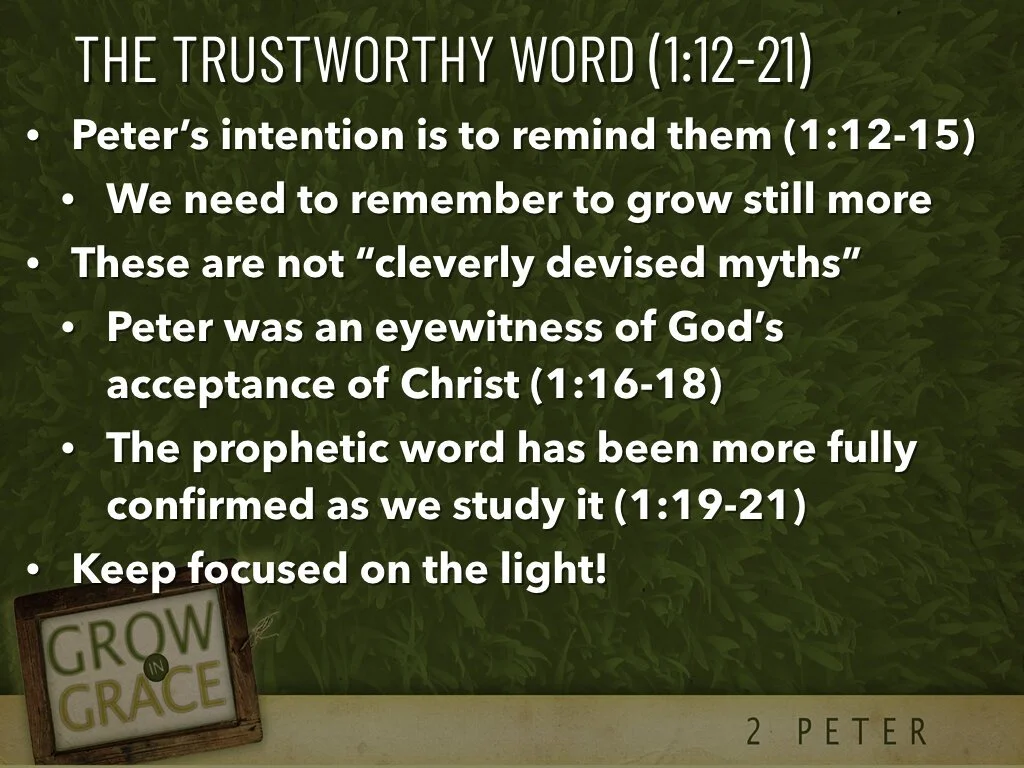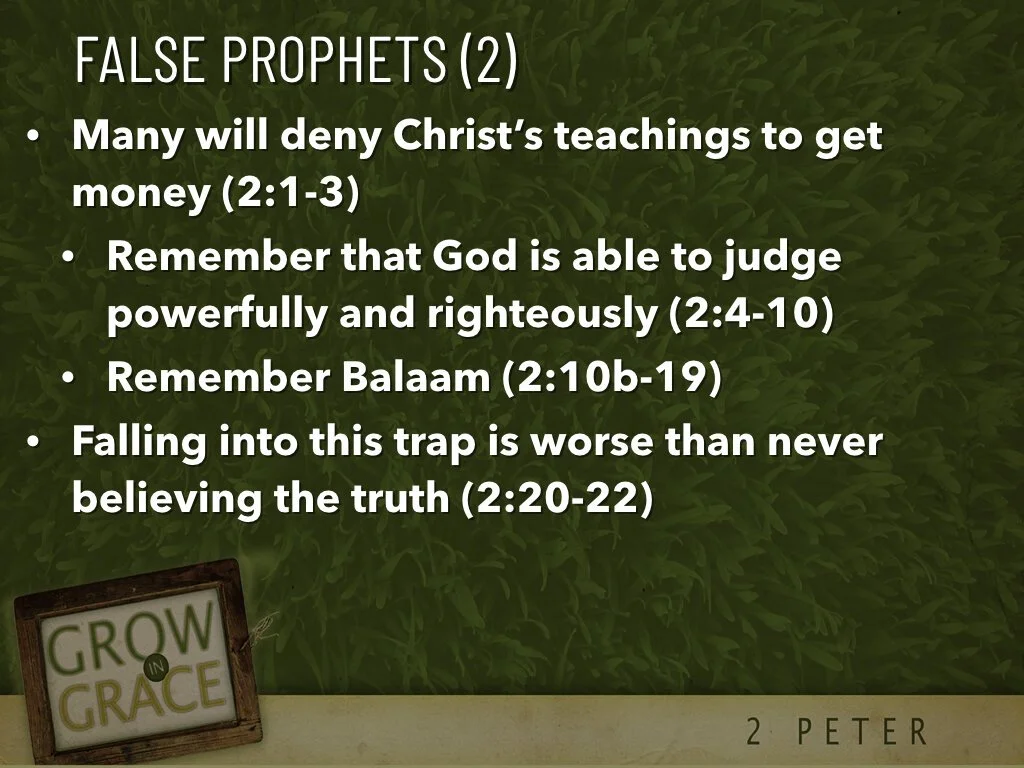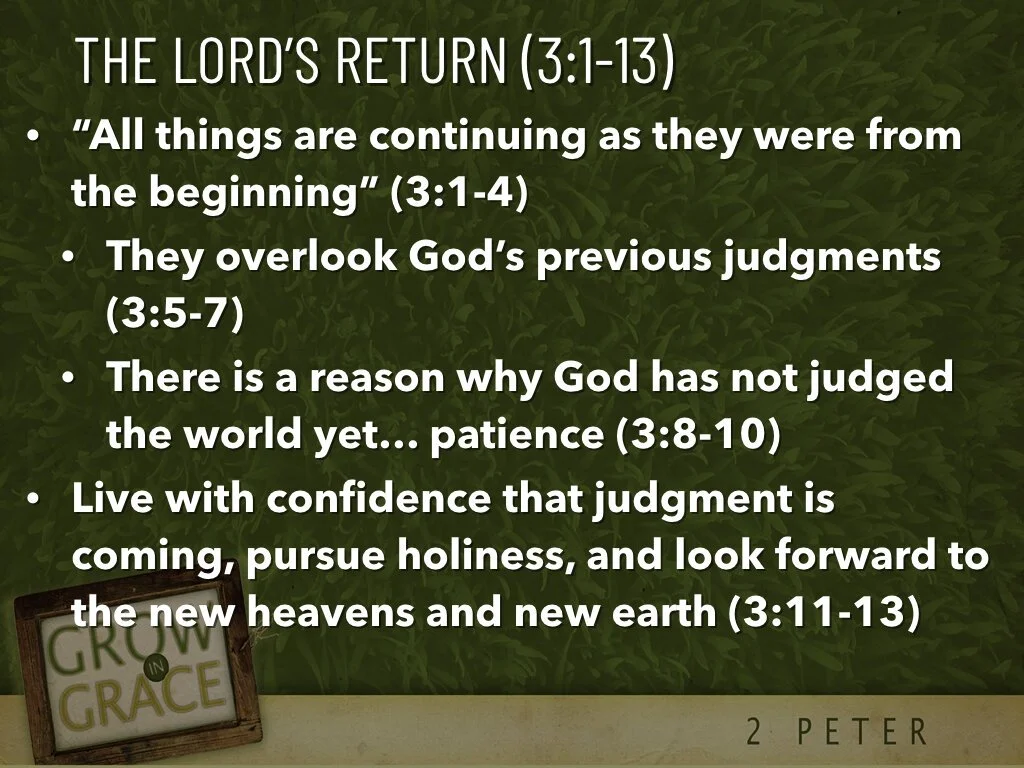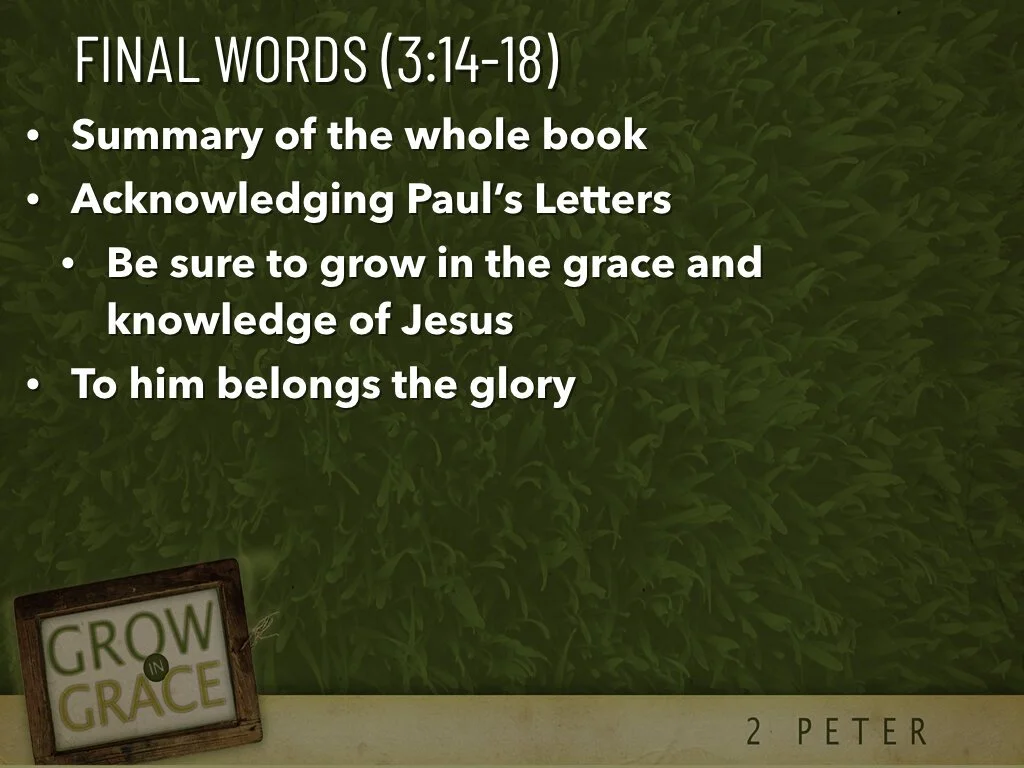Growing In Grace (2 Peter)
March 1, 2020
How confident are you in your salvation? Those of us who have received the grace of God and submitted to his will initially may, at times, doubt our salvation. We wonder if God really will love us after all that we have done and if we are doing enough to satisfy him. It is good for us to wonder about these things. That curiosity should motivate us to study God’s word and to find certainty in our salvation through a greater understanding. But in many ways, this can be dangerous.
I remember speaking to a member at one point who said, “I don’t think anyone can know for sure if they are saved until they get to the Judgment Day.” They also said, “I’m just going to try my very best to do what God wants me to do, but I don’t know if that’s enough.” I understand the sentiment and humility, but there is also a lack of faith in God’s faithful love. Some people might resist that doubt and push us to the opposite extreme. They might teach us to have overconfidence in our salvation. They might tell us that we can do just about anything without being afraid of falling away. The letter we are studying tonight helps us have the right perspective. It tells us how to be confident in our salvation and how to avoid the traps that lead many to fall away. This whole letter is Peter’s attempt to keep his readers devoted to faithfulness.
The Promise of Christian Living (1:1-11)
At the beginning of this letter, Peter lays out the excellent news of what God has done for us.
We Have Life and Godliness (1:1-4)
2 Peter 1:1--4 (ESV) --- 1 Simeon Peter, a servant and apostle of Jesus Christ, To those who have obtained a faith of equal standing with ours by the righteousness of our God and Savior Jesus Christ: 2 May grace and peace be multiplied to you in the knowledge of God and of Jesus our Lord. 3 His divine power has granted to us all things that pertain to life and godliness, through the knowledge of him who called us to his own glory and excellence, 4 by which he has granted to us his precious and very great promises, so that through them you may become partakers of the divine nature, having escaped from the corruption that is in the world because of sinful desire.
Again, Peter starts his letter with a mind-blowing statement! He is talking to all of those who have faith like him, and he tells us that God’s divine power has given us “All things that pertain to life and godliness.” Think about what this means. God has made it to where we can have life again and to where we can be like God. In the garden, we were kicked out and cursed to die. But now we have hope for the reversal of those things. How did he do that? He decided to reveal who he is to us through the life of Jesus so that we can become like him. We can fulfill our purpose by being his image-bearers.
We may look at this and think, “There is no way we could be like God.” But that’s what life and godliness are. He has given everything we need to have a relationship with God. Then in verse 4, Peter says that God wanted to convince us to buy into this, so he made promises through Jesus. He has removed what was corrupted in us and provided us with a means of always having those things removed. He repeated this idea saying, “Through them, you may become partakers of the divine nature.” Our sins are forgiven once and for all, past, present, and future. We can grow to be like God.
The first four verses of this letter help us see our purpose, and he starts motivating us to fulfill it. We are supposed to look at what God has given us and understand how blessed we are. We have everything we need to become like God and to live with him for all eternity.
Do This And Never Fall (1:5-11)
The words that follow this opening statement tell us seven specific things that we need to focus on to become more like God. These are needed in addition to our faith. We aren’t going to read through the whole letter, but understanding this first section is critical for us to understand the entire message.
2 Peter 1:5--11 (ESV) --- 5 For this very reason, make every effort to supplement your faith with virtue, and virtue with knowledge, 6 and knowledge with self-control, and self-control with steadfastness, and steadfastness with godliness, 7 and godliness with brotherly affection, and brotherly affection with love. 8 For if these qualities are yours and are increasing, they keep you from being ineffective or unfruitful in the knowledge of our Lord Jesus Christ. 9 For whoever lacks these qualities is so nearsighted that he is blind, having forgotten that he was cleansed from his former sins. 10 Therefore, brothers, be all the more diligent to confirm your calling and election, for if you practice these qualities you will never fall. 11 For in this way there will be richly provided for you an entrance into the eternal kingdom of our Lord and Savior Jesus Christ.
Peter gives us a list of seven qualities to add to our faith. The list includes things that are a huge part of spiritual growth (virtue, knowledge, self-control, steadfastness, godliness, brotherly kindness, love) Then, he makes us three promises to motivate us to grow in these qualities. First, he says that if they are in us and are increasing, we won’t be ineffective or unfruitful. This is an amazing promise. If we feel as though we are ineffective and unfruitful in our work for the Lord, this is how we must grow in fruitfulness and effectiveness. Second, he says in verse 10 that if we are practicing these qualities, we will never fall. If we do not feel sure of our salvation, practicing these qualities is the way for us to be sure. Finally, in verse 11, he says that by practicing these qualities, an entrance into the eternal kingdom will be richly provided. These three promises are the three promises that we are looking for as children of God.
The Trustworthy Word (1:12-21)
In the second section, Peter describes the purpose of his letter, and he reveals where we must turn to grow in these areas.
In verses 12-15, we find the purpose of Peter’s second letter. Peter has a sincere desire for Christians to remember these qualities after he is gone. This may be Peter’s final letter. So he wants to write down what he wants Christians to remember so that they will remain faithful after he is gone.
In verses 16-21, he helps his readers understand the value of his words and the words of all the apostles and prophets. These are not words that men have made up. Peter, himself, was an eyewitness of the events that took place with Jesus. He mentions God explicitly calling Jesus His “Beloved Son, with whom I am well pleased.” He has seen how the words of the prophets have been confirmed in the life of Christ.
2 Peter 1:19--21 (ESV) --- 19 And we have the prophetic word more fully confirmed, to which you will do well to pay attention as to a lamp shining in a dark place, until the day dawns and the morning star rises in your hearts, 20 knowing this first of all, that no prophecy of Scripture comes from someone’s own interpretation. 21 For no prophecy was ever produced by the will of man, but men spoke from God as they were carried along by the Holy Spirit.
This is the way he wants his readers to view the word of God in the Old Testament. It is a lamp shining in a dark place that is bringing us to a fuller understanding of the light of Christ. Notice how he speaks of the prophecy in the Old Testament. It is not just man’s interpretation of what God says. Peter says that the prophets were “carried along by the Holy Spirit.” All of the things that they wrote down for us to read are intended to be understood as the Holy Spirit’s inspiration.
So we ought to view the words of the apostles and prophets as the trustworthy message that comes from God. Everyone who is not an apostle or prophet is interpreting the word of God, but these men were giving us the uninterpreted description of God’s word. This makes their word the source of our spiritual growth. The words of the prophets and apostles will help us supplement our faith with virtue, knowledge, self-control, steadfastness, godliness, brotherly affection, and love.
False Prophets (2)
In Chapter 2, Peter warns his readers that they will be tempted to listen to false prophets.
Motivations of False Prophets (2:1-19)
Many false prophets are seeking their gain. Their efforts will result in destruction rather than spiritual growth. They use religion to profit for themselves. In 2:4-10, he gives three examples of how false prophets have destroyed the world in the past. The first example is the condemnation of angels (which we don’t know anything about), the second is the condemnation of the ancient world at the time of Noah, and the third is the condemnation of Sodom and Gomorrah at the time of Lot. These examples show how extensively God is able and willing to destroy those who pursue what is false and evil. He is not a fluffy teddy bear that we can run all over and abuse.
Peter makes a point in that text that those who are godly will be rescued from the trials they endure as they live in an ungodly world, just like God rescued Lot and Noah.
2 Peter 2:9--10 (ESV) --- 9 then the Lord knows how to rescue the godly from trials, and to keep the unrighteous under punishment until the day of judgment, 10 and especially those who indulge in the lust of defiling passion and despise authority. Bold and willful, they do not tremble as they blaspheme the glorious ones,
The second half of verse 10 through verse 19 describes those who are false teachers. He says that they are blasphemous as they speak against the truth and try to curse those whom God has chosen to save. Verse 15 says, “They have followed the way of Balaam,” who went to the king of Moab to try to curse Israel to make money. These men are trying to promote themselves and destroy God’s people for money rather than advancing the will of God. How are they able to convince people to follow them and leave the truth?
2 Peter 2:19 (ESV) --- 19 They promise them freedom, but they themselves are slaves of corruption. For whatever overcomes a person, to that he is enslaved.
They are training people to go back to their old way of life and giving them a false sense of security. Do we see how Peter is trying to keep his readers from being deceived? He does not want us to fall. We like the idea of being saved without repenting, and false teachers will play on that. They will try to convince us that it is possible to be saved and live how we want to live. Look what Peter says is happening.
The Second Fall Is Worse
2 Peter 2:20--22 (ESV) --- 20 For if, after they have escaped the defilements of the world through the knowledge of our Lord and Savior Jesus Christ, they are again entangled in them and overcome, the last state has become worse for them than the first. 21 For it would have been better for them never to have known the way of righteousness than after knowing it to turn back from the holy commandment delivered to them. 22 What the true proverb says has happened to them: “The dog returns to its own vomit, and the sow, after washing herself, returns to wallow in the mire.”
This is the way God views those who turn back to the old way of life. They have completely forgotten what God and Christ have done for them, and they are worse than before.
Scoffing The Lord’s Return (3:1-13)
The last chapter begins with a restatement of his intention to stir these Christians up. But then he brings up a reality that we have to face today.
2 Peter 3:1--4 (ESV) --- 1 This is now the second letter that I am writing to you, beloved. In both of them I am stirring up your sincere mind by way of reminder, 2 that you should remember the predictions of the holy prophets and the commandment of the Lord and Savior through your apostles, 3 knowing this first of all, that scoffers will come in the last days with scoffing, following their own sinful desires. 4 They will say, “Where is the promise of his coming? For ever since the fathers fell asleep, all things are continuing as they were from the beginning of creation.”
He says that people will begin to scoff followers of Christ. Scoffing and ridicule are devices that are used to belittle our beliefs and make us feel stupid for believing it. When people scoff and ridicule, they are trying to justify their viewpoint by ignoring evidence and giving a false understanding of the other side’s view. Peter specifically talks about the predictions of the prophets and the commandment of Jesus that he will return and bring judgment against those who are living rebellious lives.
Peter combats this way of thinking by stating that God is an infinite being who created everything, and if he was willing to destroy the earth by water in the past when we rebelled against him, he is willing to destroy the earth with fire in the future. Then he makes a second argument. He says that God can destroy the earth today or a thousand years from now. It doesn’t make a difference to him. His decision to keep from destroying the world is based on his patience and love for those who are rebellious. He hopes that they will turn from their rebellion and submit to his rule.
Beginning in verse 11, he rounds out his message by saying that God’s promise to judge those who are living in sin should motivate us to strive for godliness even more.
Summary (3:14-18)
The last five verses sum up all that he is trying to say. He encourages his readers to be diligent in pursuing holiness. He wants them to consider God’s patience toward them while they were rebellious. He wants them to be careful not to be carried away by lawless people. Finally, he says to “grow in the grace and knowledge of our Lord and Savior Jesus Christ” so that he may be glorified.
What Do We Learn?
If we want to be sure of our salvation, God has given us everything we need to do that. We have an understanding of God that provides us with endless opportunities to grow in the seven areas mentioned in Chapter 1. Maybe you hear all of this and thinking, “I don’t have to grow to be saved” or “I can’t grow.” Peter makes it clear that God expects us to be growing and living godly lives. If we refuse to grow, we may die again, which is worse than never knowing the truth.
Listen to the promise of 1:9. He says, “Whoever lacks these qualities is so nearsighted that he is blind, having forgotten that he was cleansed from his former sins.” If we lack these qualities, we are in a dangerous position. This is an interesting picture. The more we know about God and Jesus, the better our eyes are for seeing the eternal home in heaven. If we are not growing in all of these, we are almost blind. We are susceptible to fall from grace. He also helps us understand what is going on in the heart of this person who is not growing. They have stopped thinking about the eternal consequences of their sinful lives. He says that we can lose track of the fact that God has graciously forgiven us and stop growing. Once we believe and understand what God has done for us, we have to keep growing in that faith to be confident that we will never fall from it.
There is a genuine danger here. If we take this letter as a whole, what we see is that stalling out in our faith will leave us susceptible to false teaching and error. The truth is that we live in a world that always wants to contradict the truth and encourage us to join them with a worldly mindset. We must be diligent and continue to grow to avoid falling. Somewhere along the way, we will run into people who teach that we can enjoy sinful living again. They will disguise that as “freedom” and tell us that we should “indulge in the lust of defiling passions and despise authority.” They will try to make us question the judgment that God has promised to enjoy those “freedoms” without fear (3:4).
The first ten years of being a Christian was difficult because of the lack of growth. Everyone was just restating the same things over and over again instead of digging deeper into the word. This is why many of my friends fell away. They stopped growing and became susceptible to the “new things” false teachers were telling them. If we have a sober mind about judgment right now, we must commit ourselves to continual growth and prepare ourselves to answer those who reject the truth.

